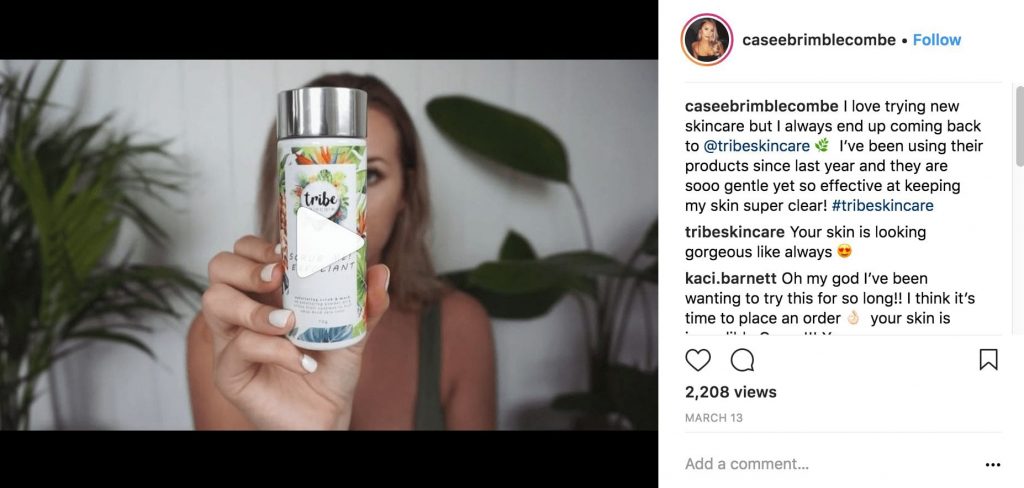Trust is an extremely important part of marketing, because if your audience doesn’t trust you, why would they give you their money?
Thankfully, influencer marketing is a tremendously effective marketing strategy that can help you do a lot of things. One of those things is to increase and improve customer trust.
Furthermore, influencer marketing can also help you establish yourself as a thought leader whom people list to, turn to, and trust, for advice. And when you have succeeded in this, your customers will completely trust you and your expertise.
Influencer marketing is effective for this building trust for many reasons, but one of the most important is that influencers already are thought leaders in their industry. Their audience listens to and trusts them. As a result, when they recommend you, people really trust and believe the recommendation. And while it sounds simple, this will only work if executed and done in the right way.

Remember that trust takes a long time to build up, but a very short time to ruin, so slow, steady, and consistency wins the race. This really is the key here. You don’t trust a person only after meeting them one time. You need constant and consistent interactions over a longer period of time in order to get the full effect. And the truth is, the same goes for influencer marketing.
It’s important to know that there are two types of audiences that will have trust in you (if you build it). Firstly, you have your own audience. Those who are supporters of your brand that you have built genuine and valuable relationships with. Then, we have the quick-fix audience, that I’ll go more into detail on the first point.
Let’s look at how you can build trust with the help of influencer marketing:
1. Quick way
The most common way brands use influencer marketing is the quick/urgent way.
As we talked about, building an engaged audience that has trust in you doesn’t exactly go overnight.
It takes consistent efforts, and the right efforts.
What many brands do is borrow and “transmit” trust from the influencer through a paid partnership or feature on their social channels. This is what can be defined as trust by association.
When you associate yourself with a thought leader whose audience trusts them, they will naturally trust your brand as well. -Even though they may have never interacted with it before. This is great news because it means that not only are you promoting your company to a brand new audience, but you’re also gaining immediate trust from anyone who values the influencer’s words.
The good news is that when you are running an influencer marketing campaign, building consumer trust is seldom the main objective of the campaign. In fact, many marketers barely and merely consider this is a by-product. In other words, at the same time as you are getting benefits from the campaign such as sales, sign-ups, and/or increased brand awareness, you’re also ultimately building people’s trust in your company.
The bottom line? The more influencer campaigns you run, the more trust you will build. As long as the campaigns are authentic and honest.

2. How can you build trust long-term?
When it comes to trust, there are quite a few practices you need to follow, long-term.
First off, you need to make sure you treat your audience the way you want to be treated. Think about: H0w would you treat them offline? Are you treating them the same way online? Are you shoving ads down their throats or are you carefully placing a recommendation in their lap? -Because it’s a huge difference.
Secondly, the golden rule of not trying to sell more makes you sell more applied. Both you and your co-workers all need to wrap your head around (if you haven’t already) that providing value without asking for anything in return is the way to not only build trust but also to drive sales as well.
When you focus more on providing value, you’ll do what’s best for your brand long-term, which avoids you to do something that may harm your brand long-term for a short-term benefit.
With that in mind, short-term gratification is something you must avoid at all costs when it comes to building customer trust. One of the most important ways you can do this is to leave the campaign almost completely to the influencer and give them full creative freedom. Many marketers want to control the campaign from start to finish, but let’s not forget that they know their audience best, and understand their needs and wants and what they resonate with.
Lastly, in order to build trust with your audience, you need to understand what they actually need. With social media at your fingertips, doing this has never been easier. Poll your audience, send out a survey, or arrange a Q&A – then apply it to your influencer marketing campaigns.

With the information gathered, you can share content that better fits your audience’s needs.
3. Take advantage of influencer-generated content
As we touched briefly on above, the influencer knows best what their audience likes, what they resonate well with, and what type of content drives the highest engagement.
A lot of brands who just don’t understand how influencer marketing works, well enough, want to take care of everything from content creating to text writing. But what they don’t realize is that in order for an influencer’s promotion and recommendation to be impactful, it needs to be authentic. And if you create the content for the influencer, it will be really difficult to ensure that the content is credible and the message come off as authentic.

People who follow the influencer knows he or she very well, which means they’ll quickly be able to tell when the words and content being put out isn’t directly created by the influencer.
As a result, the influencer will lose trust, and you as a company certainly won’t gain any.
People love to see content created by someone they trust. Because when they do, they naturally trust the content that is being put out.
At the same time, they hate to see ads by brands. This is why you want to leverage influencer-generated content in your marketing. This means that from your campaign, you get another benefit, which is that the benefits from your campaigns will extend much further than the time the campaign is live.
Don’t go and just place your ads in the hands of the influencer because that doesn’t do it any better. Offer the audience a seamless experience by effortlessly incorporating ads in the influencer’s social presence.
4. Work with laser targeted influencers
This point is absolutely crucial both for a successful influencer marketing campaign, but in particular for building trust. This is because who you work with will determine a lot of the success.
For example, let’s say you are selling makeup products. Do you think the followers of an influencer who is solely focusing on sports would like to see content related to makeup? The answer is no, and if you do, the content will create a disconnect between the influencer and the audience. As a result, the campaign won’t be very successful, and you won’t be able to enjoy the benefits of the results that could have been if you would have chosen a more suitable influencer to work with.


